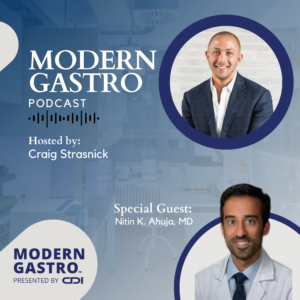Welcome to the Second Episode of the Modern Gastro Podcast 
Listen to episode 2 here
Unveiling Insights into Gastrointestinal Health
Welcome, fellow enthusiasts of gastroenterology, to another illuminating episode of the Modern Gastro podcast. I’m Craig Strasnick, the founder and CEO of Commonwealth Diagnostics International, and your host for this captivating journey into the intricacies of functional gastroenterology. Our mission here is to delve beneath the surface and explore the multifaceted dimensions of this fascinating field, guided by industry leaders who offer a unique blend of personal experience, scientific expertise, and business acumen.
In today’s episode, we have the privilege of delving into a condition that impacts millions worldwide: irritable bowel syndrome (IBS). Joining us is Dr. Nitin Ahuja, a distinguished gastroenterologist and assistant professor at Penn Medicine. Together, we’ll unravel the complexities of IBS diagnostics, treatment strategies, and its intriguing relationship with small intestinal bacterial overgrowth (SIBO).
Nitin K. Ahuja, MD, MS, is Assistant Professor of Clinical Medicine and Co-Director, Program in Neurogastroenterology and Motility and in the Division of Gastroenterology and Hepatology at the University of Pennsylvania. He is also a board-certified gastroenterologist for Penn Medicine. His clinical interests are in motility disorders of the gastrointestinal tract, and his research interests are in the history, literature, and culture of medicine. He went to medical school at the University of Michigan, completed his residency at the University of Virginia, and completed his fellowship at the Johns Hopkins Hospital.
Exploring the Landscape of IBS Diagnostics
Dr. Ahuja kicks off our discussion by shedding light on the evolving landscape of IBS diagnostics. Traditionally, the focus has been on excluding other potential causes through tests like endoscopies and blood work. However, there’s a shift towards identifying specific biomarkers of IBS, offering a more precise approach to therapy. Exciting advancements include exploring gut microenvironments and microbial signatures, as well as integrating psychological surveys to understand the holistic patient experience.
Navigating the Intersection of Digestive and Mental Health
Our conversation extends beyond physiological symptoms to the vital connection between digestive and mental health. Dr. Ahuja emphasizes the transition from viewing gastrointestinal issues as functional disorders to recognizing them as brain-gut interactions. By acknowledging this connection, clinicians can tailor treatments to address both physical and psychological aspects, ultimately enhancing patient care.
Challenges in Patient Management and Therapeutic Strategies
As we delve deeper, we confront the challenges of differentiating between similar conditions like IBS, SIBO, and GERD. Dr. Ahuja shares the complexities of interpreting diagnostic data, especially when patients arrive with preconceived notions based on external sources. Despite these challenges, he emphasizes the importance of honest patient-provider partnerships and the ongoing pursuit of diverse therapeutic options.
The Role of Multidisciplinary Care in Gastrointestinal Health
Our discussion underscores the value of multidisciplinary approaches in managing gastrointestinal disorders. Integrating dietitians, nutritionists, and lifestyle coaches into the care continuum empowers patients to actively participate in their well-being. Dr. Ahuja highlights the need for access to a diverse range of resources to support comprehensive patient care effectively.
Looking Ahead: Trends and Future Directions
In our closing remarks, we contemplate the future of gastroenterology, envisioning a shift towards precision-based approaches and the integration of big data analytics. Dr. Ahuja underscores the importance of refining diagnostic terminology and leveraging emerging technologies to tailor therapies to individual patient phenotypes.
As we wrap up this enriching conversation, I extend my heartfelt gratitude to Dr. Nitin Ahuja for sharing his expertise and insights. To our audience, thank you for joining us on this journey through the ever-evolving realm of functional GI disorders. Remember, the quest for knowledge and collaboration doesn’t end here—keep the conversation alive on social media using the #GICommunity hashtag, and together, let’s drive progress in digestive health. Stay tuned for more thought-provoking discussions from Modern Gastro. Until next time, this is Craig Strasnick from Commonwealth Diagnostics International, signing off.
Quotes from Dr. Ahuja:
- “I think switching from the language of functional GI disorders to disorders of brain interaction has been really empowering in terms of receiving some of these symptoms and having these connections in the body and unburdening ourselves of the baggage of stigma that some patients feel.”
- “Patients come to a doctor hoping for a clean diagnosis and a cynical prescription that will fix their symptoms or at least improve them. And so, having the conversation that we’re often still defaulting to a guess and check model, in today’s practice is also a challenge. But, you know, hope for the future for sure.”
Follow Dr. Ahuja on Social Media channels:




